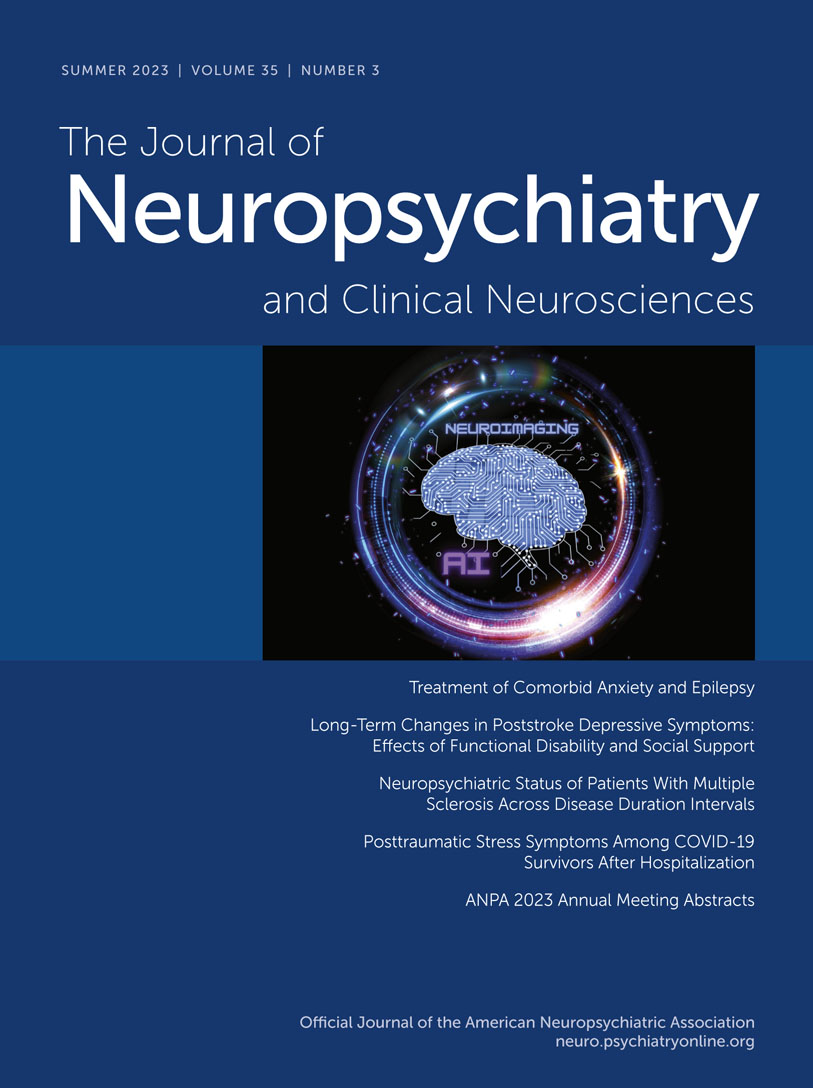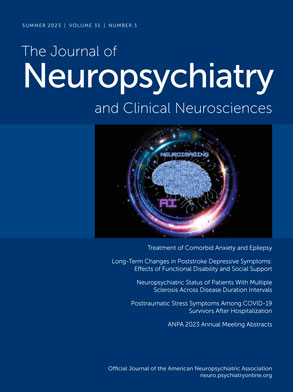Multiple sclerosis (MS) is an immune-mediated demyelinating condition that affects approximately 2.8 million people globally (
1). The neurological symptoms of MS are varied, multifocal, and disabling, which contributes to greater unemployment, reduced life expectancy, and considerable health care costs (
2,
3). In addition, depression, anxiety, fatigue, and cognitive impairment are common (
4–
6). Although at times underrecognized, these neuropsychiatric sequelae of MS are significant predictors of employment, quality of life, and mortality (
7–
9). Recent research has found that depression and fatigue have a greater impact on quality of life than physical impairment or demographic characteristics (
7), and perceived and objective cognitive deficits are important for predicting vocational status (
8).
Understanding how neuropsychiatric symptoms vary with disease duration is important to people with MS and their care providers. The existing data present a mixed picture. Cognitive function deteriorates over time (
10,
11); however, only one longitudinal study examined changes in self-appraisal of cognitive abilities (
12). Results from previous studies evaluating depression are mixed, with some but not all studies (
13,
14) reporting an association with disease duration (
15,
16). Anxiety has been less well studied, but the same equivocal association with disease duration is present (
14,
15,
17). Although there are some exceptions (
18,
19), the literature generally does not support a worsening in fatigue with increasing disease duration (
16,
20).
A shared limitation of all of these studies is that longitudinal symptom assessment included a maximum of one or two symptoms (
18,
19). Due to demographic and disease-related differences across individual studies, identifying a consistent pattern of changes in neuropsychiatric symptoms over time can be challenging. In the one study that examined fatigue, depressive symptoms, and anxiety symptoms over time, the authors found a gradual decline in anxiety symptoms with no associated changes in fatigue or depressive symptoms (
17). However, the duration of follow-up in this study was limited to 3 years. Another limitation of the aforementioned studies is the absence of associated treatment data. For many people with MS, disease-modifying therapies, psychotropic medications, and psychotherapy are common approaches to managing the neuropsychiatric sequelae (
21). Without these data, symptom monitoring among this population presents an incomplete picture of their neuropsychiatric status.
As a whole, the literature on MS lacks studies that examine the associations between a more complete array of neuropsychiatric variables (e.g., objective and subjective cognitive dysfunction, depression, anxiety, and fatigue) and longer disease durations. Such an approach offers the potential for increasing understanding of the evolution of a complex neuropsychiatric picture that is integral to optimally caring for people with MS.
Results
The data for the entire sample are presented in
Table 1. The mean±SD age was 46.39±11.62 years, and the median EDSS score was 2.5. Sixty-nine percent of the participants were female, and 65% of the sample had relapsing-remitting MS.
Between-group comparisons in demographic, disease-related, and treatment characteristics are presented in
Table 2. These comparisons show significant differences with respect to disease course, age, and EDSS scores. As disease duration increased, a greater proportion of participants had a secondary progressive course, fewer participants received disease-modifying therapies, and the proportion receiving psychotropic medications increased. Those receiving psychotherapy declined after 5 years of having the disease.
Between-group comparisons in neuropsychiatric symptoms are presented in
Table 3. Anxiety symptoms and rates of cognitive impairment significantly differed across groups. In particular, anxiety symptoms were more severe in the group with a disease duration of <5 years compared to the groups with a disease duration of 5–10 years (p
=0.02, 95% CI=0.19, 3.09) and >10 years (p<0.01, 95% CI=0.73, 3.13). Global cognitive impairment was more frequent in the group with a disease duration of >10 years compared to the groups with a duration of <5 (U=2,890.50, p=0.04) and 5–10 (U=2,098.00, p=0.03) years. For differences in individual cognitive tests, see Table S1 in the
online supplement. There were no significant differences among the three disease duration groups in depression symptoms, fatigue, or subjective cognitive impairment.
Discussion
Here, we describe a spectrum of neuropsychiatric symptoms stratified according to disease duration in people with MS. A longer disease duration was associated with a statistically significant increase in physical disability and a more progressive course of illness. People with MS were administered fewer disease-modifying therapies but more psychotropic drugs and received less psychotherapy. Levels of anxiety declined, most notably from 5 years after diagnosis, whereas symptoms of depression and fatigue remained constant. Frequency of cognitive dysfunction increased, particularly after 10 years, which was not matched by subjective perceptions of cognitive deficits. We will discuss each of these findings in turn, while recognizing that our methodology did not address causality.
The MS literature has identified several factors that could explain higher severity of anxiety within the first 5 years of diagnosis. These factors include receiving the diagnosis of a potentially life-altering condition (
33), having little social support (
34), and having ineffective coping mechanisms (
35) while failing to receive disease-modifying therapies (
36). Although some studies have described anxiety occurring soon after disease onset (
17,
33), there is a paucity of data that describe how symptoms change over time. Our findings suggest that anxiety lessens with time; although it should be noted that more than 10 years from diagnosis, the mean HADS anxiety score remained above the threshold score of 8.0 that is indicative of clinically significant symptoms (
26).
The fact that our data did not reveal an association between disease duration and depression likely reflects the interplay of numerous potentially causative factors associated with depression. These factors include pro-inflammatory cytokines such as tumor necrosis factor alpha and interferon gamma (
35), regional lesion burden and atrophy that would appear as brain MRI abnormalities (
37), varying coping styles (
38), and other psychosocial factors such as reduced social participation or disease-related threats to self-esteem and autonomy (
39). These same factors may also explain the equivocal MS literature pertaining to disease duration and frequency of depression, with both reports for (
13,
14) and against (
15,
16) such an association. Our finding that antidepressant use increased with time is notable and suggests that depression may have increased with disease duration but was successfully treated—hence the overall steady prevalence rate. While this hypothesis is intriguing, our study design does not allow us to definitively draw such a conclusion.
Our finding that self-awareness of cognitive abilities did not match objective evidence of cognitive decline over time fits with the MS literature reporting deficits in metacognition (
40). The notable aspect of our finding is that low insight into cognition was likely present across the lifespan of the disease. The only other identified study examining subjective cognitive impairment found no significant difference in self-reported cognition between 12 and 36 months following diagnosis (
12). Our results extend this finding to a much longer disease duration.
An interesting observation consistent with these findings is the decrease in psychotherapy with a longer disease duration. One possible explanation is that psychotherapy is more often provided in response to a new diagnosis of MS and that with the passage of time, anxiety declines to a degree, and the perceived need for this intervention lessens. It is striking, however, that as the frequency of psychotherapy decreases, the use of antidepressant medication increases. This occurs in parallel to the decrease in the use of disease-modifying therapies. This particular trend is understandable—as more people develop a progressive course of illness, fewer disease-modifying therapies are available (
41). Given limited existing knowledge of trends in psychotherapy provision for people with MS, additional research is needed to determine if these findings are linked.
Our finding that fatigue does not increase over time is both supported (
16,
20) and not supported (
18,
19) by studies in the MS literature. Consistent with our finding was the observation that the use of stimulant medications increased with increases in disease duration. As noted above, we found a similar relationship with depression and the use of antidepressant medications. However, although medications have been shown to help depression, albeit modestly (
42), a recent randomized, placebo-controlled, crossover, double-blind trial demonstrated a lack of efficacy for stimulant medications such as amantadine, modafinil, and methylphenidate (
43). Whether the same holds true for individuals included in our data set is not known, and our methodology precludes the identification of a causal association.
As previously mentioned, a limitation in our study is the delineation of disease duration with a stratification approach. The absence of longitudinal data impedes our ability to go beyond reporting associations by extracting causal relationships. Furthermore, our data were obtained from an MS neuropsychiatry clinic, not a general neurology MS clinic, and, as such, involve particular biases. Although the level of disability identified in this sample resembles MS population-level estimates (
44,
45) and other neuropsychiatric samples (
14,
17,
18), it may not adequately describe the neuropsychiatric sequelae of people with severe disability. Additionally, in this study, disease duration was estimated from diagnosis due to challenges with retrospectively identifying symptom onset. Consequently, with an average delay of 30 months from symptom onset to diagnosis of MS (
46), this study may have failed to capture a period of potentially heightened anxiety and changes in other neuropsychiatric symptoms. As noted in Table S2 in the
online supplement, the sample of participants with available cognitive data was generally younger and had more individuals with relapsing-remitting illness and fewer individuals treated with disease-modifying therapies. This may reflect a limitation of the cognitive findings. Finally, it is expected that the rates of comorbid conditions in this study resemble those of a typical sample with MS who attend a tertiary neuropsychiatry clinic; however, these details were not available for this sample. It is possible that the older people in the group with a disease duration of greater than 10 years have more comorbid medical conditions, as previously reported (
47). This association may account for some cognitive changes in this sample; however, rather than a caveat of these findings, this possibility reflects the clinical reality for many people with MS.

